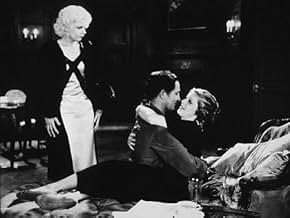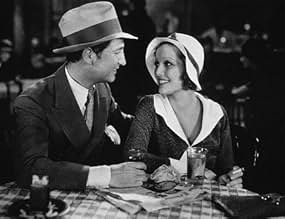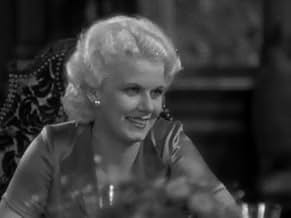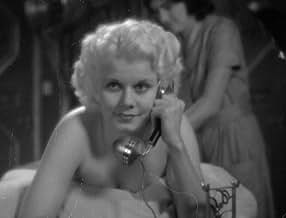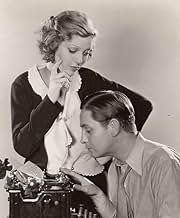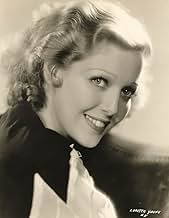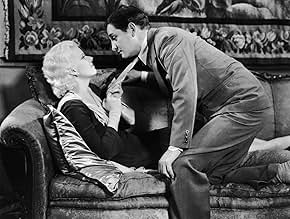IMDb RATING
6.7/10
3.9K
YOUR RATING
A young woman from a very rich family impulsively marries a reporter, but each assumes the other is the one whose lifestyle must change.A young woman from a very rich family impulsively marries a reporter, but each assumes the other is the one whose lifestyle must change.A young woman from a very rich family impulsively marries a reporter, but each assumes the other is the one whose lifestyle must change.
- Awards
- 2 wins total
Don Dillaway
- Michael Schuyler
- (as Donald Dillaway)
Claud Allister
- Dawson - The Valet
- (as Claude Allister)
Wilson Benge
- Butler
- (uncredited)
Vance Carroll
- Reporter
- (uncredited)
Eddy Chandler
- Hank - A Reporter
- (uncredited)
Richard Cramer
- Speakeasy Proprietor
- (uncredited)
Oliver Eckhardt
- Reporter
- (uncredited)
Adolph Faylauer
- Party Guest
- (uncredited)
J.C. Fowler
- Reporter
- (uncredited)
Featured reviews
In The Films Of Frank Capra Citadel Film Series and in his memoirs, Frank Capra described Platinum Blonde as a film that Columbia did strictly as a moneymaker, no messages of social significance that would be found in his later classic work, just a nice girl-boy-girl comedy. Still and probably because Robert Riskin did some of the dialog I found plenty of things that would be instantly recognizable in Capra's more well known films.
The Platinum Blonde is of course Jean Harlow and this film title gave her the title she would have the rest of her short life. She's a society girl who sweeps reporter Robert Williams off his feet and into marriage much to the chagrin of her formidable dowager mother Louise Closser Hale.
Someone else is chagrined as well, Loretta Young who was only 18 when she made this film. Loretta and her sisters added a few years onto their ages in order to work back then. Loretta plays one of Williams fellow reporters who is known only by her last name of Gallagher. Just like Jean Arthur was known as Saunders in Mr. Smith Goes To Washington. Lots of similarities between the two though Arthur's character was far more sophisticated than Young.
Still Platinum Blonde more closely resembles Mr. Deeds Goes To Town. Williams is like Gary Cooper trapped in that big mansion. Only it was Cooper's own mansion that he inherited. Robert Williams is in on a pass and on a kind of probation so to speak, to see if he can adjust to life among the idle rich. In 1931 lots of people would have liked to have been given the opportunity.
The only one in the household he strikes up some kind of friendship with is butler Halliwell Hobbes. Note the echo business with them, it would be repeated in Mr. Deeds.
The week Platinum Blonde was released with reviews acclaiming Williams as a new star, he died of peritonitis. What an incredible loss, he was an actor with a breezy insouciance just like Robert Montgomery or William Haines over at MGM. He probably could also have done parts at Columbia that James Cagney was doing at Warner Brothers. Williams could have been Harry Cohn's first major star of the sound era. Anyway his comic timing was perfect and he steals the film from those two movie legends who were his leading ladies.
You'll also like Reginald Owen's portrayal as Harlow's family attorney and general busybody. Williams also deals with him in the way Gary Cooper ultimately dealt with his shyster.
Platinum Blonde is one of Frank Capra's best early films and watching it will make you sad though when you see Robert Williams and you will agree that he had a brilliant career ahead of him.
The Platinum Blonde is of course Jean Harlow and this film title gave her the title she would have the rest of her short life. She's a society girl who sweeps reporter Robert Williams off his feet and into marriage much to the chagrin of her formidable dowager mother Louise Closser Hale.
Someone else is chagrined as well, Loretta Young who was only 18 when she made this film. Loretta and her sisters added a few years onto their ages in order to work back then. Loretta plays one of Williams fellow reporters who is known only by her last name of Gallagher. Just like Jean Arthur was known as Saunders in Mr. Smith Goes To Washington. Lots of similarities between the two though Arthur's character was far more sophisticated than Young.
Still Platinum Blonde more closely resembles Mr. Deeds Goes To Town. Williams is like Gary Cooper trapped in that big mansion. Only it was Cooper's own mansion that he inherited. Robert Williams is in on a pass and on a kind of probation so to speak, to see if he can adjust to life among the idle rich. In 1931 lots of people would have liked to have been given the opportunity.
The only one in the household he strikes up some kind of friendship with is butler Halliwell Hobbes. Note the echo business with them, it would be repeated in Mr. Deeds.
The week Platinum Blonde was released with reviews acclaiming Williams as a new star, he died of peritonitis. What an incredible loss, he was an actor with a breezy insouciance just like Robert Montgomery or William Haines over at MGM. He probably could also have done parts at Columbia that James Cagney was doing at Warner Brothers. Williams could have been Harry Cohn's first major star of the sound era. Anyway his comic timing was perfect and he steals the film from those two movie legends who were his leading ladies.
You'll also like Reginald Owen's portrayal as Harlow's family attorney and general busybody. Williams also deals with him in the way Gary Cooper ultimately dealt with his shyster.
Platinum Blonde is one of Frank Capra's best early films and watching it will make you sad though when you see Robert Williams and you will agree that he had a brilliant career ahead of him.
I see that I'm in good company here on IMDb in first wondering why on earth I had never heard of Robert Williams before and then in regretting that his career was cut so short after hearing his story.
Williams proves himself to be a winning and engaging comedian in this very funny Frank Capra film about a reporter (Williams) who marries a society dame (Jean Harlow) only to realize that his true love is for the female co-worker (Loretta Young) who's been by his side the whole time. Never mind that Young is one hundred times more feminine and prettier than Harlow -- I just chalk it up to the theory that Harlow had a certain look that was very much in vogue in the 1930s and that made her extremely attractive to people.
I don't think Harlow is at all attractive, but I do see her appeal, and I didn't find her performance to be as bad in this film as the history books have claimed. It's true that the casting should have been reversed, and Young should have played the society belle with Harlow as the working-class girl next door. But never mind. She equips herself pretty well with the material given her, and she manages to be believable in the role.
But in any case, it's neither of the women you'll remember from this movie. It's Williams and his absolutely fantastic way with a funny line. He died of appendicitis at the age of 37, and it's clear that 30s movie audiences lost a potentially major star when they lost him.
Grade: A-
Williams proves himself to be a winning and engaging comedian in this very funny Frank Capra film about a reporter (Williams) who marries a society dame (Jean Harlow) only to realize that his true love is for the female co-worker (Loretta Young) who's been by his side the whole time. Never mind that Young is one hundred times more feminine and prettier than Harlow -- I just chalk it up to the theory that Harlow had a certain look that was very much in vogue in the 1930s and that made her extremely attractive to people.
I don't think Harlow is at all attractive, but I do see her appeal, and I didn't find her performance to be as bad in this film as the history books have claimed. It's true that the casting should have been reversed, and Young should have played the society belle with Harlow as the working-class girl next door. But never mind. She equips herself pretty well with the material given her, and she manages to be believable in the role.
But in any case, it's neither of the women you'll remember from this movie. It's Williams and his absolutely fantastic way with a funny line. He died of appendicitis at the age of 37, and it's clear that 30s movie audiences lost a potentially major star when they lost him.
Grade: A-
Platinum Blonde launched so many careers - the most infamous being Frank Capra and Jean Harlow. It is not a perfect film by any stretch of the imagination. The sound is bad, Harlow is terribly miscast, and poor Loretta Young struggles valiantly to bring depth to a part that is the filmic equivalent of wallpaper. As many have said before me, she and Harlow would have done well to reverse roles.
But the greatest on screen portrayal of fresh, modern, naturalistic acting (a style that later would be attributed to James Dean) is from the wonderful, refreshingly brilliant young Robert Williams in 1931!!!!! I would never mark this film as a masterpiece, yet I would encourage all struggling male actors to study this man's work as a prime example of how to dominate a scene without any artifice or aggression. Every time he enters a room, the whole film lights up, and every time he leaves, all the other actors seem to lose their purpose and energy.
I have never seen such simple perfection, and I am saddened to no end to learn of his untimely death at thirty-four, just as he was starting to get roles worthy of his genius. I could not get enough of this man's work, and regret having so little of it to view. An absolute must see for Robert Williams alone!
But the greatest on screen portrayal of fresh, modern, naturalistic acting (a style that later would be attributed to James Dean) is from the wonderful, refreshingly brilliant young Robert Williams in 1931!!!!! I would never mark this film as a masterpiece, yet I would encourage all struggling male actors to study this man's work as a prime example of how to dominate a scene without any artifice or aggression. Every time he enters a room, the whole film lights up, and every time he leaves, all the other actors seem to lose their purpose and energy.
I have never seen such simple perfection, and I am saddened to no end to learn of his untimely death at thirty-four, just as he was starting to get roles worthy of his genius. I could not get enough of this man's work, and regret having so little of it to view. An absolute must see for Robert Williams alone!
Robert Williams doesn't even get any billing n the DVD cover or on other promotions of this film, but he IS the star of the film....and he is outstanding.
Williams could have been a major star, a very well-known actor, had he not died four days after this picture was released with a ruptured appendix. The man simply puts on an acting clinic here. I wonder if young aspiring actors are ever shown this film and told to study Williams? If is wasn't for this film, I assume nobody would ever know about this guy.
Anyway, the movie is really dated but its interesting thanks to some great dialog, mainly, once again, by Williams. Jean Harlow gets the billing but a young Loretta Young has the real beauty and charm here. Too bad her role was so minor and bland. She looked absolutely gorgeous.
The storyline is one of Hollywood's favorite themes: the average Joe beating up on the snobby rich people. Harlow's "mother" in here (Louise Closser Hale) plays that snob role perfectly.
Even though I just gave it six stars, there are lots of laughs in this film and it was a lot better than I thought it would be. Watching Williams' acting performance is worth the price of the disc, and then some.
Williams could have been a major star, a very well-known actor, had he not died four days after this picture was released with a ruptured appendix. The man simply puts on an acting clinic here. I wonder if young aspiring actors are ever shown this film and told to study Williams? If is wasn't for this film, I assume nobody would ever know about this guy.
Anyway, the movie is really dated but its interesting thanks to some great dialog, mainly, once again, by Williams. Jean Harlow gets the billing but a young Loretta Young has the real beauty and charm here. Too bad her role was so minor and bland. She looked absolutely gorgeous.
The storyline is one of Hollywood's favorite themes: the average Joe beating up on the snobby rich people. Harlow's "mother" in here (Louise Closser Hale) plays that snob role perfectly.
Even though I just gave it six stars, there are lots of laughs in this film and it was a lot better than I thought it would be. Watching Williams' acting performance is worth the price of the disc, and then some.
After watching Platinum Blonde, I, like most other viewers, had to look up Robert Williams, wondering whatever happened to him while fearing the worst, the worst being true: he died shortly after he made this film. Tragic! One can wonder endlessly over what might have been. What is clear is that he was a natural for the camera, was highly skilled (years of stage experience behind him), and fit perfectly into the Capra-Riskind universe of tough-but- articulate Everyman up against monied mediocrities. He might well have ended up playing the Clark Gable role in It Happened One Night if he had been around at the time. In fact, the reporter he plays here seems like a first draft for that character. (The plot involves Williams as a reporter falling in love impulsively with the daughter of a wealthy Social Register family only to encounter the usual boobytraps built into such a union.)
The movie itself, though hard to separate from Williams's domination of it, stands up fairly well on its own. There are some imaginative camera movements and setups and intelligent, witty dialogue laced with fizzy Depression-era argot. The story is not very convincing but you suspend disbelief because of the way the actors, dialogue and cinematography bring it to life. The pace is leisurely, sometimes a bit too much so, with many minutes taken up in gentle, playful, ultra-naturalistic banter between Williams and his co-stars. I can't think of another film from that period that detoured so often into that type of throwaway conversational interlude.
Jean Harlow as the heiress and Loretta Young as a newspaper columnist are not ideally cast. Their roles should have been reversed, but it doesn't really matter because both actresses do well. Harlow, who by this time had had relatively little experience in front of a camera, seems right at home about 90% of the time. And it's hard to believe that Loretta Young was only 18 when she made this! But she had already been a veteran of several years standing as a film actress.
The movie itself, though hard to separate from Williams's domination of it, stands up fairly well on its own. There are some imaginative camera movements and setups and intelligent, witty dialogue laced with fizzy Depression-era argot. The story is not very convincing but you suspend disbelief because of the way the actors, dialogue and cinematography bring it to life. The pace is leisurely, sometimes a bit too much so, with many minutes taken up in gentle, playful, ultra-naturalistic banter between Williams and his co-stars. I can't think of another film from that period that detoured so often into that type of throwaway conversational interlude.
Jean Harlow as the heiress and Loretta Young as a newspaper columnist are not ideally cast. Their roles should have been reversed, but it doesn't really matter because both actresses do well. Harlow, who by this time had had relatively little experience in front of a camera, seems right at home about 90% of the time. And it's hard to believe that Loretta Young was only 18 when she made this! But she had already been a veteran of several years standing as a film actress.
Did you know
- TriviaIn a 2008 interview, actor Christopher Plummer called Williams "...one of the most realistic comedians the screen had. He made Cary Grant look like he was overacting... To watch Robert Williams act was like seeing a comic using the Method, long before the Method became famous with Marlon [Brando] (Marlon Brando) and Monty [Clift] (Montgomery Clift)."
- GoofsWhen they are looking at the front page of "The Tribune Paper", in the headlines, the word "okay" is misspelled. It shows "It's okey with me."
The spelling of "OK" was not standardized for a long time. Writer Dashiell Hammett among others spelled it "okeh" and "oke",
- Quotes
Dexter Grayson: Where were you yesterday?
Anne Schuyler: Oh, Stew and I went for a long ride. Dexter, is there any finishing school we could send him to?
Dexter Grayson: Yes - Sing Sing!
- ConnectionsEdited into 365 days, also known as a Year (2019)
- How long is Platinum Blonde?Powered by Alexa
Details
Box office
- Budget
- £600,000 (estimated)
- Runtime
- 1h 29m(89 min)
- Color
Contribute to this page
Suggest an edit or add missing content

